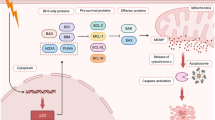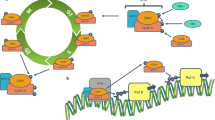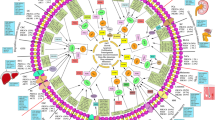Abstract
The tumour suppressor gene p53 is mutated in approximately 50% of the human cancers. p53 is involved in genotoxic stress-induced cellular responses. The role of EGFR and ERK in DNA-damage-induced apoptosis is well known. We investigated the involvement of activation of ERK signalling as a consequence of non-functional p53, in sensitivity of cells to doxorubicin. We performed cell survival assays in cancer cell lines with varying p53 status: MCF-7 (wild-type p53, WTp53), MDA MB-468 (mutant p53, MUTp53), H1299 (absence of p53, NULLp53) and an isogenic cell line MCF-7As (WTp53 abrogated). Our results indicate that enhanced chemosensitivity of cells lacking wild-type p53 function is because of elevated levels of EGFR which activates ERK. Additionally, we noted that independent of p53 status, pERK contributes to doxorubicin-induced cell death.







Similar content being viewed by others
References
Ahsan A, Hiniker SM, Ramanand SG, et al. 2010 Role of epidermal growth factor receptor degradation in cisplatin-induced cytotoxicity in head and neck cancer. Cancer Res. 70 2862–2869
Busse D, Doughty RS, Ramsey TT, et al. 2000 Reversible G(1) arrest induced by inhibition of the epidermal growth factor receptor tyrosine kinaserequires upregulation of p27(KIP1) independent of MAPK activity. J. Biol. Chem. 275 6987–6995
Chhipa RR and Bhat MK 2007 Bystander killing of breast cancer MCF-7 cells by MDA-MB-231 cells exposed to 5-fluorouracil is mediated via Fas. J. Cell. Biochem. 101 68–79
Chhipa RR, Kumari R, Upadhyay AK, et al. 2007 Abrogation of p53 by its antisense in MCF-7 breast carcinoma cells increases cyclin D1 via activation of Akt and promotion of cell proliferation. Exp. Cell Res. 313 3945–3958
Coradini D, Biganzoli E, Ardoino, et al. 2015 p53 status identifies triple-negative breast cancer patients who do not respond to adjuvant chemotherapy. Breast 3 294–297
Cui T, Chen Y, Yang L, et al. 2012 The p53 target gene desmocollin 3 acts as a novel tumor suppressor through inhibiting EGFR/ERK pathway in human lung cancer. Carcinogenesis 33 2326–2333
Dixit M, Yang JL, Poirer MC, et al. 1997 Abrogation of cisplatin-induced programmed cell death in human breast cancer cells by epidermal growth factor antisense RNA. J. Natl. Cancer Inst. 89 365–373
Donato NJ, Perez M, Kang H, et al. 2000 EGF receptor and p21WAF1 expression are reciprocally altered as ME-180 cervical carcinoma cells progress from high to low cisplatin sensitivity. Clin. Cancer Res. 1 193–202
Dong P, Xu Z, Jia N, et al. 2009 Elevated expression of p53 gain-of-function mutation R175H in endometrial cancer cells can increase the invasive phenotypes by activation of the EGFR/PI3K/AKT pathway. Mol. Cancer. 8 103
El-Deiry WS 2003 The role of p53 in chemosensitivity and radiosensitivity. Oncogene 22 7486–7495
Fernández CL, Oakman C, Falagan LP, et al. 2012 Prognostic and predictive value of TP53 mutations in node-positive breast cancer patients treated with anthracycline- or anthracycline/taxane-based adjuvant therapy: results from the BIG 02-98 phase III trial. Breast Cancer Res. 14 R70
Garcia R, Franklin RA and McCubrey JA 2006 Cell death of MCF-7 human breast cancer cells induced by EGFR activation in the absence of othergrowth factors. Cell Cycle 16 1840–1846
Hoshino R, Tanimura S, Watanabe K, et al. 2001 Blockade of the extracellular signal-regulated kinase pathway induces marked G1 cell cycle arrest and apoptosis in tumor cells in which the pathway is constitutively activated: up-regulation of p27(Kip1). J. Biol. Chem. 276 2686–2692
Huang S, Benavente S, Armstrong EA, et al. 2011 p53 modulates acquired resistance to EGFR inhibitors and radiation. Cancer Res. 71 7071–7079
Kim KK, Lee JJ, Yang Y, et al. 2008 Macrophage inhibitory cytokine-1 activates AKT and ERK-1/2 via the transactivation of ErbB2 in human breast and gastric cancer cells. Carcinogenesis 29 704–712
Ko JC, Ciou SC, Cheng CM, et al. 2008 Involvement of Rad51 in cytotoxicity induced by epidermal growth factor receptor inhibitor (gefitinib, IressaR) and chemotherapeutic agents in human lung cancer cells. Carcinogenesis 29 1448–1458
Lachat Y, Diserens AC, Nozaki M, et al. 2004 INK4a/Arf is required for suppression of EGFR/DeltaEGFR(2-7)- dependent ERK activation in mouse astrocytes and glioma. Oncogene 23 6854–6863
Lehmann-Che J, André F, Desmedt C, et al. 2010 Cyclophosphamide dose intensification may circumvent anthracycline resistance of p53 mutant breast cancers. Oncologist 15 246–252
Licitra L, Suardi S, Bossi P, et al. 2004 Prediction of TP53 status for primary cisplatin, fluorouracil, and leucovorin chemotherapy in ethmoid sinus intestinal-type adenocarcinoma. J. Clin. Oncol. 22 4901–4906
Marampon F, Bossi G, Ciccarelli C, et al. 2009 MEK/ERK inhibitor U0126 affects in vitro and in vivo growth of embryonal rhabdomyosarcoma. Mol. Cancer Ther. 8 543–551
Maruthampu M, Watkins J, Noor AM, et al. 2016 Economic downturns, universal health coverage, and cancer mortality in high-income and middle-income countries 1990-2010: a longitudinal analysis. Lancet 388 684–695
Moerkens M, Zhang Y, Wester L, et al. 2014 Epidermal growth factor receptor signalling in human breast cancer cells operates parallel to estrogenreceptor α signalling and results in tamoxifen insensitive proliferation. BMC Cancer 14 383
Mollgard L, Saft L, Treppendahl MB, et al. 2011 Clinical effect of increasing doses of lenalidomide in high-risk myelodysplastic syndrome and acute myeloid leukemia with chromosome 5 abnormalities. Haematologica 96 963–971
Oden-Gangloff A, Di Fiore F, Bibeau F, et al. 2009 TP53 mutations predict disease control in metastatic colorectal cancer treated with cetuximab-based chemotherapy. Br. J. Cancer. 100 1330–1335
Patricia AJ, Muller PAJ and Vousden KH 2014 Mutant p53 in cancer: new functions and therapeutic opportunities. Cancer Cell 25 304–317
Rieber M and Rieber MS 2009 DN-R175H p53 mutation is more effective than p53 interference in inducing epithelial disorganization and activation of proliferation signals in human carcinoma cells: role of E-cadherin. Int. J. Cancer 125 1604–1612
Singh S, Upadhyay AK, Ajay AK, et al. 2007 p53 regulates ERK activation in carboplatin induced apoptosis in cervical carcinoma: a novel target of p53 in apoptosis. FEBS Lett. 581 289–295
Tang D, Wu D, Hirao A, et al. 2002 ERK activation mediates cell cycle arrest and apoptosis after DNA damage independently of p53. J. Biol. Chem. 277 12710–12717
Upadhyay AK, Ajay AK, Singh S, et al. 2008 Cell cycle regulatory protein 5 (Cdk5) is a novel downstream target of ERK in carboplatin induced death of breast cancer cells. Curr. Cancer Drug Targets 8 741–752
Ventura A, Krisch DG, McLaughlin ME, et al. 2007 Restoration of p53 function leads to tumour regression in vivo. Nature 445 661–665
Wang X, Martindale JL and Holbrook NJ 2000 Requirement for ERK activation in cisplatin-induced apoptosis. J. Biol. Chem. 275 39435–39443
Wansom D, Light E, Worden F, et al. 2010 Correlation of cellular immunity with human papillomavirus 16 status and outcome in patients with advanced oropharyngeal cancer. Arch. Otolaryngol. Head Neck Surg. 136 1267–1273
Wei F, Yan J and Tang D 2011 Extracellular signal-regulated kinases modulate DNA damage response - a contributing factor to using MEK inhibitors in cancer therapy. Curr. Med. Chem. 18 5476–5482
Acknowledgements
The authors thank Dr SC Mande, Director, NCCS, Pune, and Dr GC Mishra, former Director, NCCS, Pune, for their support and encouragement in carrying out this work. RK and SS thank the University Grants Commission (UGC), RRC and SC thank the Council for Scientific and Industrial Research (CSIR), AKA thanks the Indian Council of Medical Research (ICMR), India, for research fellowships. This work was supported in part by intramural funding from National Centre for Cell Science (NCCS), Department of Biotechnology (DBT), India. The funding agencies had no involvement in study design, data collection, interpretation and analysis, decision to publish or writing of the manuscript.
Work described in this paper is a part of thesis submitted by RK in 2010 to University of Pune, Pune.
Author information
Authors and Affiliations
Corresponding author
Additional information
[Kumari R, Chouhan S, Singh S, Chhipa RR, Ajay AK and Bhat MK 2017 Constitutively activated ERK sensitizes cancer cells to doxorubicin: Involvement of p53-EGFR-ERK pathway. J. Biosci.]
Supplementary materials pertaining to this article are available on the Journal of Biosciences Website.
Ratna Kumari, Surbhi Chouhan and Snahlata Singh contributed equally to this work.
Supplementary materials pertaining to this article are available on the Journal of Biosciences Website.
Electronic supplementary material
Below is the link to the electronic supplementary material.
ESM 1
(DOC 3882 kb)
Rights and permissions
About this article
Cite this article
Kumari, R., Chouhan, S., Singh, S. et al. Constitutively activated ERK sensitizes cancer cells to doxorubicin: Involvement of p53-EGFR-ERK pathway. J Biosci 42, 31–41 (2017). https://doi.org/10.1007/s12038-017-9667-8
Received:
Accepted:
Published:
Issue Date:
DOI: https://doi.org/10.1007/s12038-017-9667-8




